Get your Proteins from Plant Sources too, not just from Meat and Dairy! Quinoa and Chickpeas Salad Recipe
Hello there!!!
Which is your very first thought when you hear the word "proteins"? 'Cause I'm sure many of you (even me) are thinking of meat (in all its form). Also dairy, eggs, fish. This is fair enough cause it's true right?
Meat = Protein
But for some reason, people tend to exagerate with the consumption of meat. They believe it's the one and only! The vegetarian sources are underestimated and thats really bad. Don't get me wrong, I'm not against eating meat. But I'm very sad when I realize people are uneducated and uninformed when it comes to nutrition and health. And not having a balanced diet is a bad habit for our lifestyle. In other words, we're going to get sick cause our bodies aren't a trash can where you can put all the miseries.
So, let's talk a bit about proteins. I will write you down here what I've learned in becoming a nutritionist.
THESE ARE THE MAIN CATEGORIES OF PROTEIN SOURCES:
Meat and Fish
Cheese
Eggs
Legumes (and beans)
Nuts and Seeds
Cereals
Other Veggies (which have a high % of protein )
Mulder in 1838, based on the finding that complex substances that contain carbon, oxygen, hydrogen, nitrogen and sulfur are found in all forms of life, he concluded that they must occupy the first place in the development of vital phenomena and named them proteins (from the word "proteias" which means first).
Proteins are nutritional principles with a plastic role, in that they are necessary for the growth of the young organism and the maintenance of the adult one.
Proteins have specific roles in the human body that cannot be replaced by any other substances. They are made up of a variable number of amino acids. Until now, there is known to be 20 amino-acids, from which 9 of them are essential. What essential amino acids means? It means that our body can't produce them and we need to take them directly from food sources.
According to their amino acid content, proteins are divided into three categories:
Class 1 proteins (high biological value)
Class 2 proteins (medium biological value)
Class 3 proteins (low biological value)
The biological value is represented by the % of Azote retained by the body. This is determined by the presence or absence of certain amino acids, in certain proportions, within proteins.
Don't think that proteins of Class 2 and 3 are not important having them into your diet. With the exception of limiting amino acids, they bring in significant quantities of other essential and non-essential amino acids, thus contributing to the completion of the metabolic background and to the reduction of the need for Class 1 proteins. Administered together with high quality proteins, they complement their deficiencies . It is even possible that by combining only vegetable proteins chosen so that they do not present the same deficiency, mixtures with high biological value can be made.
CLASS 1 PROTEINS (alsoo called Complete Proteins)
They contain all the amino acids in optimum proportions and suitable quantities for the human body. Most of the animal proteins are part of this group. (meat, eggs, marine animals and their derivatives)
CLASS 2 PROTEINS (Partially Complete Proteins)
They contain all the amino acids but some of them are in smaller proportions (limiting amino acids) having lower generic protein capacity. Which is why you need to combine these so you have the right amount of protein. BUT!!! BUT!!! A big BUT here! Don't make an obsession trying to combine these proteins to every meal you have. If you have a balanced and DIVERSE diet, its no need for this. Especially vegans need to follow this rule because they dont eat Class 1 Proteins.
We're talking about wheat, rice, oats, barley (all cereals), quinoa, buckwheat (all pseudocereals), beans, soybeans, and legumes (peas, chickpeas, lentils)
Here you have a link to read more about protein food combinations, but in one sentence here it is:
Legumes +Cereals
Legumes + Nuts
Cereals + Nuts
Also, don't forget about NUTS and SEEDS!!! Nutritional speaking, they are classified as being lipides (foods rich in healthy oils) but they ARE A GREAT AND IMPORTANT SOURCE OF PROTEINS too. (because they have high levels of protein intake). Also, the aquatic environment is an important alternative source of food with a high percentage of protein substances. (like ALGAES).
CLASS 3 PROTEINS (incomplete proteins)
They have a low biological value due to the lack of essential amino acids and the imbalance of proportion. (corn, cartilages, tendons, bone gelatin).
This is a orientative list of Protein intake in Foods (g/100g). Maybe the percentage might differ a bit from website to website, book to book.
- Wheat germ 27%
- Peanuts, pumpkin seeds 26-28%
- Dried Soy, Lentils, beans, peas 20-25%
- Nuts 20%
- Wheat, barley, oats 13-16%
- Corn 9%
- Milk and derivates 3.5-30%
- Fish and fish eggs 2-30%
- Meats and derivates 15-30%
- Eggs 14%
- Spinach, cauliflower, potatoes, cabagge, mushrooms 3-5%
Down here you can see a comparision between Animal Protein Sources and Plant Based Protein Sources. Both are vital for our body. What's more important than debating which are best or which are worst its BALANCE!! Unless you are a vegan/vegetarian you need to choose wisely your sources. Diversity is the key! And just one more advice, cause I can't help it... try to have MORE plant-based sources than meat! that's the right way:)
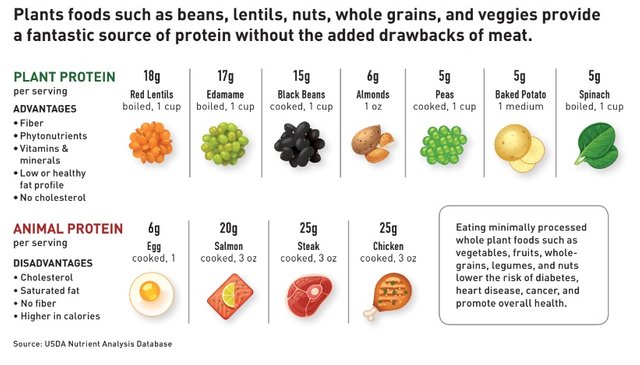
[ Source here]
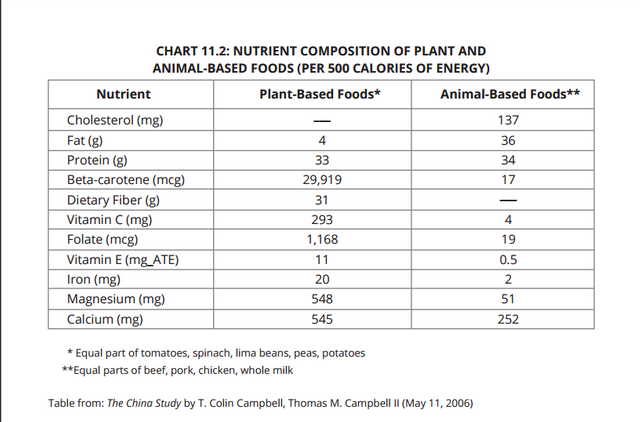
[ Source here]
Now, here's a recipe I had. It has it all! Protein, fats, carbos, greens, veggies! And its meat free!
No fuss with it! Just boil the quinoa before and the rest its all done! Cut and mix the ingredients and you'll have a very nutritious salad meal. (pretty much these are the instructions). And dont forget to strain the chickpeas and quinoa. I think we're all clear. Usually this kind of recipe doesn't need to many instructions cause its way to easy to make it!!!
Enjoy darlings! this recipe or your own recipes! This is also a very important thing to have in mind. Always eat your food with joy and glad!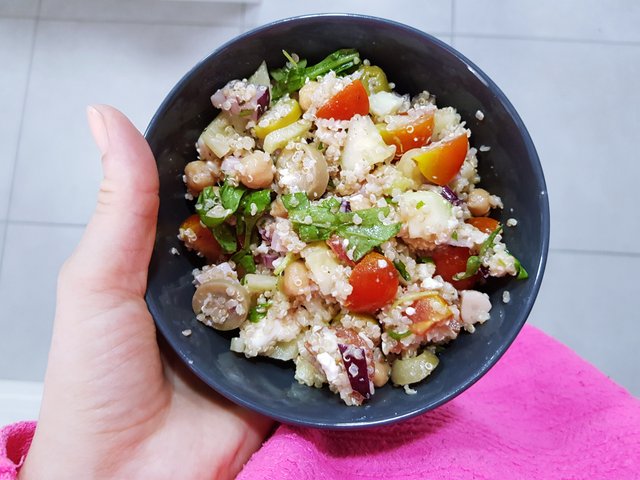
INGREDIENTS:
- chickpeas from can or boiled
- boiled quinoa
- arrugula (rocket salad)
- feta cheese
- green olives
- tomatoes
- cucumber
- pepper
- red onion (or yello, white, shallots whatever)
- for dressing I used lemon and basil olive oil
- salt and peper for taste (optional) I used only black pepper
Just a small thing I almost forgot!
THE ROLE OF PROTEINS in the human body
The role of protein in the body is particularly important because it enters into the cellular construction of tissues as well as into blood plasma and into the lymph, and the proportion varies with where it is found and in need.
Protein is the element of construction and repair that is absolutely necessary for the body and, knowing that the human body wears its tissues daily, we understand that it needs a reparative substance and this is the protein through its amino acids.
Proteins represent 16-19% of the weight of an adult and 75-78% of the dry and delipidated substance of the body. So a person with a weight of 65 kg will need about 65g of protein daily. Together with glucides and lipides, proteins gives our body the energy it needs to to perform all its vital functions.
Besides the fact that it enters the structure of all cells and helps in their growth and recovery, proteins play a role in regulating the activity of the body. It also participates in the formation of antibodies, helping to get rid of toxins and microbes.
An insufficient amount of protein can lead to the following states:
- poorly developed growth
- functional nervous diseases
- affecting the resistance of the tonus
- decreased reproductive capacity
- early aging
The excess of protein leads to a lot of diseases due to liver and kidney wear, which, unable to perform the function of albumin transformation and filtering of harmful elements, let it penetrate into the bloodstream and even into tissues, albumin in a form harmful to the body.
It is known that an increase in dietary protein can lead to kidney stones, uremia, gout, arteriosclerosis. These phenomena, associated with dehydration, increases the risk of vascular injury to the kidneys, coronary arteries, and arteries of the lower limbs. We could say that half of the diseases could be avoided if we paid attention to protein consumption, both quantitatively and qualitatively.
Well, thats it for this post people!
I wish to end this writting with a few of my favourite quotes:
Let food be thy medicine and medicine be thy food. - Hippocrates
The phisician treats, but the nature heals! - Hippocrates
Stay healthy!! :p
Love,
Miss Deli
❤️
ALL CONTENT IS MINE AND ORIGINAL! ALL THESE PHOTOS WERE TAKEN WITH MY SAMSUNG S8.
If you like my work, comment, upvote and resteem! Or if you want to stay in touch with me for more delicious healthy recipes and articles on health, HIT the Follow button on my blog!
Proud member of @naturalmedicine Team.
LOTS OF NATURAL HEALING AND LOVE TO YOU ALL!! ❤️
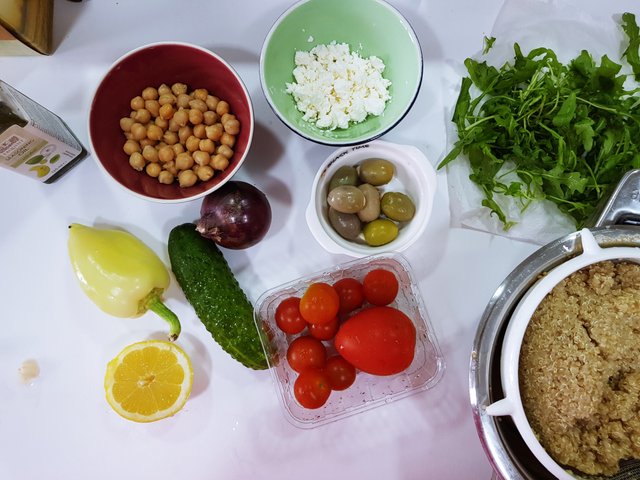
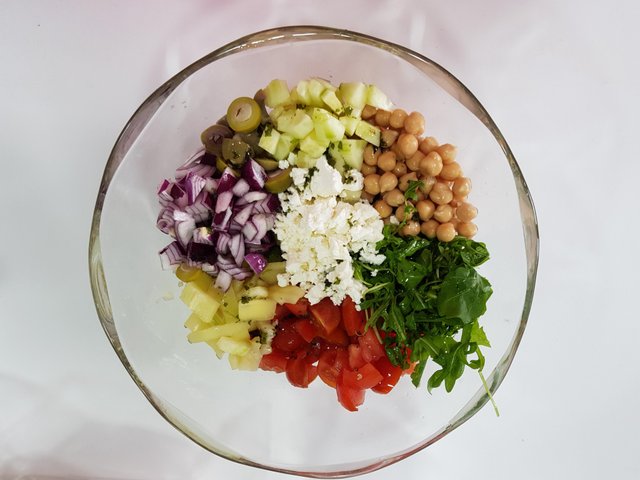
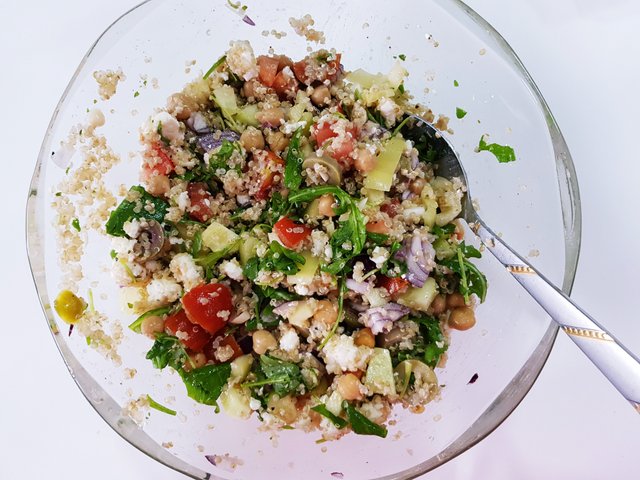
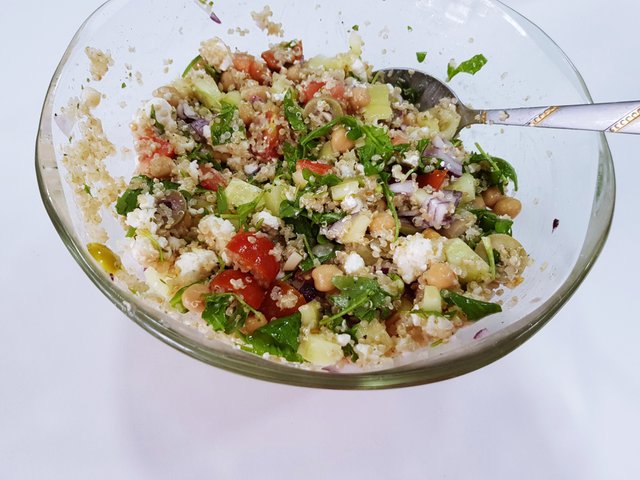
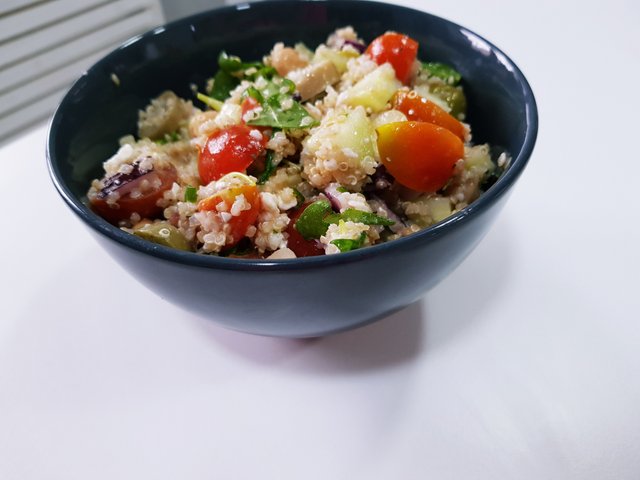

Damn. I get a lot of protein then :p
Really? What do you mean?
This post was shared in the Curation Collective Discord community for curators, and upvoted and resteemed by the @c-squared community account after manual review.
@c-squared runs a community witness. Please consider using one of your witness votes on us here
Thank you sooooo soooo much @c-squared!! YOU ROCK!!!!
Posted using Partiko Android
Thank you dear steemitmamas!!!
Great info! There definitely is still a lot of misconceptions about protein, so posts like this are a great way to help educate people. I still get asked all the time about protein since becoming vegan. I always tell people I actually have more muscle than I have ever had, so I am not wasting away on my plant-based diet! I've got black beans and quinoa simmering away in the slow cooker right now... :)
Hey!! you're so right! plant-based proteins are more higher in microelements than meat ! plus other benefits. Unless you're vegan, I would keep my animal protein intake at the lowest I can! I also just put to hydrate some almonds and buckwheat!!
this definitely good info for protein source !
来自于 [WhereIn Android] (http://www.wherein.io)
How glad I am @sibehgeng! I will try to post more stuff like this!! Maybe its useful for others too!
Well. I almost eat beans everyday at dinner and sometimes I have it with lentils.
I also drink a smoothie daily with a handful of fresh spinach plus hamp and flax seeds :D